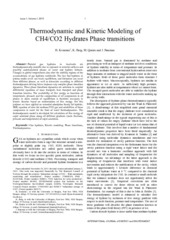Thermodynamic and Kinetic Modeling of CH4/CO2 Hydrates Phase transitions
Peer reviewed, Journal article
Published version

Åpne
Permanent lenke
https://hdl.handle.net/1956/16355Utgivelsesdato
2013Metadata
Vis full innførselSamlinger
Sammendrag
Natural gas hydrates in reservoirs are thermodynamically unstable due to exposure to mineral surfaces and possibly undersaturated phases of water and hydrate formers. Changes in global temperatures also alter the stability regions of the accumulations of gas hydrates worldwide. The fact that hydrates in porous media never can reach equilibrium, and formation can occur from different phases, as well as dissociate according to different thermodynamic driving forces imposes very complex phase transition dynamics. These phase transitions dynamics are solutions to coupled differential equations of mass transport, heat transport and phase transition kinetics. The availability of free energy as functions of temperature, pressure and the composition of all components in all phases in states outside of equilibrium is therefore necessary in kinetic theories based on minimisation of free energy. For this purpose we have applied an extended adsorption theory for hydrate, SRK equation of state for methane/CO2 gas and solubilities of these components in water for the limit of water thermodynamics. The thermodynamic model is developed for calculation of free energy of super saturated phase along all different gradients (mole fractions, pressure and temperature) of super saturation.
